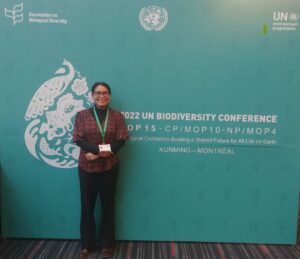At the end of 2021, A Rocha Peru started an initiative with Pastor José Guzmán from Iglesia Casa de Oración in Pacasmayo, northern Peru, to develop a community kitchen in San Demetrio. El comedor popular Micaela Bastidas was facing the challenge of improving its modest premises. In response, A Rocha Peru installed an improved cookstove for self-sufficiency, set up an organic garden and a space for rearing small animals, and introduced environmental education activities. The collaboration proved a significant catalyst that inspired the local government and companies to get involved and complement this work by developing the building structure, improving the kitchen, and providing a water cistern. Through these combined efforts, the Micaela Bastidas community kitchen was transformed. It became a communal hub run by local women committed to preparing and serving daily nutritious meals to 28 families of 120 adults and children. This inspiring example of community work shows the multiplying impact that A Rocha Peru is having in the communities it serves.
Iglesia Verde project moves to Lima!
The Iglesia Verde project moved to Lima this year and will be working in the outskirts of the Lima district. A Rocha Peru’s project is partnering with GZB and the Iglesia Betel de Lima (Betel church of Lima), a Presbyterian church led by Pastor Elmer Laura Quiñones. Grecia Valdivia is coordinating the activities as the new Project Officer. Aligned with the Creation Care Program, it aims to spread awareness and sensitize pastors, leaders, community, and church members on the importance of conservation and preservation of God’s Creation. The project will be working directly with approximately 80 beneficiaries. This includes church members, the Red de Jóvenes Presbyterians del Perú (Presbyterian Youth Network of Peru), and the Club de Madres Sarita Colonia (Sarita Colonia Mothers’ Club). The project will conduct in-person workshops on composting, home plant care, and recycling. For the youth network, the project will run a virtual course about the environmental challenges of our time, such as climate change, biodiversity loss, and environmental pollution. In addition, the course will teach the importance of ecosystem conservation and restoration and how we can work together to protect the environment and improve the quality of life in our communities.
Buzzing our way towards sustainability
An achievement from La Libertad Dry Forest Project this past year has been the installation of apiaries in Tronco Prieto Forest, where the honey bees forage on the flowering algarrobo trees. Bees play a crucial role in biodiversity conservation by pollinating wildflowers and help to conserve the dry forest. With a dedicated beekeeper, the project team explored the Tronco Prieto dry forest and met with Muchick Conservation Group to investigate the possibility of installing apiaries. Later in the year, the project held two sustainable training workshops for the local community on beekeeping. The new trainees will manage the apiaries installed in Tronco Prieto to produce honey. The beekeeping initiative is on track to beekeeping success, already making 12 litres of organic honey in January!
A Rocha Peru attends COP15
A Rocha was at the UN Biodiversity Conference (CBD COP15) in Montreal from 7-19 December 2022. Maria de los Angeles La Torre Cuadros represented A Rocha Peru as part of the A Rocha delegation to the conference. Maria de los Angeles is A Rocha Peru’s Board Chair and Director of Science and Conservation, and below is her reflection on attending the UN Biodiversity Conference.
“This meeting was a space to raise awareness of the situation of biological diversity, to see that the problems are a shared responsibility, to raise awareness of them … and investigate solutions among the various actors, to negotiate common actions, and to make progress in reducing the progressive loss of biodiversity. Commitments involve the whole of society from the financial sector, and business, to governments, ngos, and civil society. Reaching agreements of financing including the extent to which rich nations support developing countries to finance biodiversity conservation. The participation of indigenous people and local communities is especially important in decision making process relating to nature and the recognition of their land rights…I believe that commitments to reduction, for example, carbon emissions, pesticide use, land use change or the destructive industry itself should not only imply financial support to developing countries but also a responsibility of those who also finance them.

I believe that a recognition of these responsibilities should be explicit and also more ambitious for their own countries. The political vision of the government of the day should not influence the agreements ….it is important not only to bring proposal but also to disseminate them in order to be visible and these four alliances that can put pressure on those who negotiate with governments. I believe that we need to listen more to those who are guardians of biodiversity, work more on raising awareness among those who finance and the various actors. If we want to bet on green infrastructure, sustainable production also implies investment in education and technology transfer for example reducing the gaps between countries in the north and south…., it was an important experience as an academic and as an actor seeking conservation to see how important it is to make visible the wellbeing done in conservation, the need for others to know about it, that you must make visible with multiple strategies what you are doing in such a way that it raises awareness of support of those who make decisions on the whole of government”.